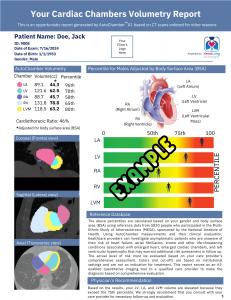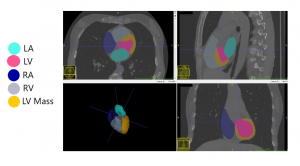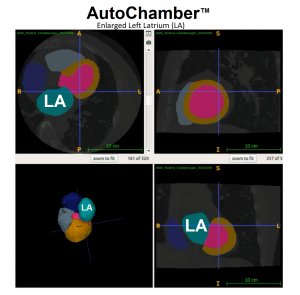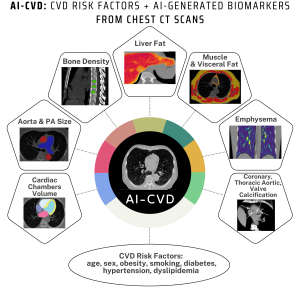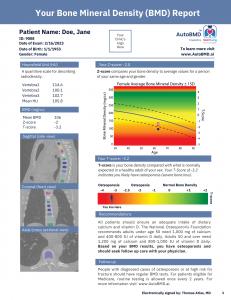
HeartLung Receives FDA “Breakthrough” Marketing Authorization for First AI to Detect Hidden Heart Disease in CT Scans
New AI flags enlarged heart chambers on non-con CT scans that are invisible to human eye and missed today leading to late-stage heart failure, Afib, and stroke.
AutoChamber™ is an opportunistic AI-powered tool that reports the volume of cardiac chambers and left ventricular wall mass in non-contrast computed tomography (CT) scans such as heart scans for coronary artery calcium (CAC) score, and lung scans for lung cancer screening and other diagnostic chest CT scans. AutoChamber™ also works on coronary CT angiography (CCTA) scans.
“HeartLung has just made history by introducing to patient care the first FDA-designated Breakthrough AI approved for opportunistic detection of asymptomatic heart disease in millions of CT scans.” said Dr. Morteza Naghavi, founder and president of HeartLung Technologies, and founder of nonprofit SHAPE (Society for Heart Attack Prevention and Eradication). “By adding AutoChamber™ AI to CT scans including coronary artery calcium (CAC) and CCTA scans, doctors not only can evaluate coronary disease but also the risk of heart failure, atrial fibrillation and stroke which are not reported today. The opportunity is even greater in millions of lung CT scans.”.
AutoChamber™ leverages deep learning based artificial intelligence and a large number of chest CT scans performed each year (more than 10 million in the U.S. alone) for purposes such as diagnostic chest workup, lung cancer screening, CAC scoring, and CCTA. By adding AutoChamber™ AI to CAC scans and analyzing both coronary artery plaque calcification and cardiac chambers volume, HeartLung plans to introduce AI-CAC™ and AI-CVD™ (see illustrations) which have the potential to advance preventive cardiology.
Today, asymptomatic patients with enlarged cardiac chambers that undergo the above CT scans are often missed - and their condition is not flagged in radiology or cardiology CT reports. Sadly, many of them will be detected when they are symptomatic in late stages of the disease where the window of opportunity for reversing their heart disease is narrow or even closed.
“This is a real breakthrough that can help save many lives from unexpected stroke and heart failure” said Dr. David Yankelevitz, professor of radiology at Icahn School of Medicine at Mount Sinai Hospital, New York who is a coauthor in several publications that used AutoChamber AI in Multi-Ethnic Study of Atherosclerosis sponsored by the National Institute of Health. “We plan to add this AI to our lung cancer screening population who are high risk for cardiovascular events. Now that this technology is FDA approved, it can also be applied to chest CT scans obtained for calcium score and CCTA. This adds a potentially lifesaving new dimension to these exams.”
The AI which takes 15-20 seconds to flag these patients creates a quantitative imaging report with appropriate percentiles and cutoff points that help physicians to take necessary actions.
HeartLung presented to the FDA several studies that compared the AI-enabled CT measurements with cardiac MRI, contrast-enhanced cardiac CT, NT-proBNP, CHARGE-AF Risk Score, ASCVD Pooled Cohort Equation, and PREVENT Risk Scores. In these studies, the AutoChamber AI convincingly outperformed the traditional epidemiological risk scores, and predicted heart failure, atrial fibrillation and stroke comparably to cardiac MRI and contrast-enhanced CT scans (see references).
“I feel strongly about the opportunity AutoChamber may have to evaluate cardiovascular risk for the millions of persons getting chest CT scans worldwide, in particular for lung cancer screening and other non-cardiac reasons” said Dr. Nathan Wong, a professor of medicine and epidemiology at University of California, Irvine who participated in AutoChamber studies and scientific publications. “The potential is for identifying those at increased risk who could benefit from earlier intervention to improve outcomes”.
The “Breakthrough” value proposition of AutoChamber™ AI for population health lies in its ability to opportunistically screen millions of CT scans that are done for other reasons and help doctors detect high-risk patients for cardiovascular disease (CVD) and sudden cardiac death (SCD). This unique aspect makes AutoChamber™ not only a cost-effective solution, but also a cost and time-saving solution for physicians and the healthcare system. There is a long list of diseases that can cause enlarged heart or enlarged cardiac chambers. By flagging these cases, AutoChamber™ AI alerts physicians to take necessary diagnostic steps to detect and treat the underlying disease in these patients who are currently missed.
“There is a lot of useful information in a heart or lung CT scan that is not currently reported because radiologists are unable to efficiently visualize or quantitatively evaluate the relevant diagnostic image features.” said Dr. Anthony Reeves, professor of electrical engineering and computer vision at Cornell University who participated in AutoChamber research studies and scientific publications. “AI-enabled algorithms like AutoChamber can fill this gap without imposing extra work on radiologists”
The AI report is patient-friendly with color-coded percentiles and snapshots of the heart chambers that patients can easily visualize and understand. AutoChamber™ AI can save lives by enabling doctors and patients to take necessary steps to stop the progression of the underlying disease and reverse the enlarged heart before it is too late. The FDA Breakthrough Device designation for AutoChamber™ follows the FDA’s recent clearance of HeartLung’s AutoBMD™, an AI-powered opportunistic bone density measurement test that works on any CT scan of the chest and abdomen to help doctors quickly identify patients who are having accelerated bone loss and are at risk of cracks, compressions or fractures in their bones which can be deadly in the elderly population.
“Our team is working hard to build the first autonomous AI for early detection and averting preventable death due to heart disease, lung cancer, osteoporosis, fatty liver disease, and other conditions which are today often detected in late and fatal stages.” added Dr. Naghavi.
About the FDA Breakthrough Device Designation:
The FDA Breakthrough Devices Program is for medical devices that provide for more effective treatment or diagnosis of life-threatening or irreversibly debilitating diseases or conditions. The Breakthrough Devices Program is intended to provide patients and health care providers with timely access to medical devices by speeding up development, assessment, and review for premarket approval and marketing authorization. Breakthrough Devices must meet the FDA’s rigorous standards for device safety and effectiveness in order to be authorized for marketing. The Breakthrough Devices Program reflects the commitment of the FDA to device innovation and protecting public health.
About HeartLung Technologies:
HeartLung Technologies aims to help people live long by averting preventable deaths caused by heart attacks, lung cancer, osteoporosis, chronic pulmonary obstructive disease (COPD), fatty liver disease, and other deadly medical conditions. HeartLung’s team of industry-leading physicians and engineers are dedicated to increasing people's lifespan and health-span by starting with taking out America’s most deadly killers: heart disease and lung cancer. By introducing innovative AI solutions such as AutoChamber™, AutoBMD™, AI-CAC™, AI-CVD™, and Auto-10™ HeartLung is innovating for the millions of Americans and many more worldwide that can benefit from early detection of preventable fatal diseases. HeartLung is a portfolio company of American Heart Technologies founded by Dr. Morteza Naghavi, a leader in preventive cardiology and health-tech innovations. Dr. Naghavi also founded nonprofit SHAPE (Society for Heart Attack Prevention and Eradication www.vp.org) and led key publications including "From Vulnerable Plaque to Vulnerable Patient" and SHAPE Guidelines. For more information about HeartLung Technologies, please visit www.heartlung.ai.
Key References:
• Naghavi M, Yankelevitz D, Reeves AP, et al. AI-enabled left atrial volumetry in coronary artery calcium scans (AI-CAC) predicts atrial fibrillation as early as one year, improves CHARGE-AF, and outperforms NT-proBNP: The multi-ethnic study of atherosclerosis. J Cardiovasc Comput Tomogr. 2024;18(4):383-391. doi:10.1016/j.jcct.2024.04.005
• Naghavi M, Yankelevitz D, Reeves AP, Budoff MJ, Li D, Atlas K, Zhang C, Atlas TL, Lirette S, Wasserthal J, Roy SK, Henschke C, Wong ND, Defilippi C, Heckbert SR, Greenland P. AI-enabled left atrial volumetry in coronary artery calcium scans (AI-CACTM) predicts atrial fibrillation as early as one year, improves CHARGE-AF, and outperforms NT-proBNP: The multi-ethnic study of atherosclerosis. J Cardiovasc Comput Tomogr. 2024 Jul-Aug;18(4):383-391. doi: 10.1016/j.jcct.2024.04.005. PMID: 38653606; PMCID: PMC11216863.
• Naghavi M, Reeves A, Atlas K, Zhang C, Atlas T, Henschke C, Yankelevitz D, Budoff MJ, FAN W, Yu R, Branch A, Ma N, Roy S, Nasir K, Molloi S, Fayad ZA, McConnell M, Kakadiaris I, Zulueta J, Maron DJ, Narula J, Shah PK, Williams KA, Levy D, Wong ND. Coronary Artery Calcium Scans Powered by Artificial Intelligence (AI-CAC) Predicts Atrial Fibrillation and Stroke Comparably to Cardiac Magnetic Resonance Imaging: The Multi-Ethnic Study of Atherosclerosis (MESA). JACC Adv. Published online October 25, 2024.
• Naghavi M, Reeves A, Atlas K, Zhang C, Atlas T, Henschke C, Yankelevitz D, Budoff MJ, FAN W, Yu R, Branch A, Ma N, Roy S, Nasir K, Molloi S, Fayad ZA, McConnell M, Kakadiaris I, Zulueta J, Maron DJ, Narula J, Shah PK, Williams KA, Levy D, Wong ND. AI-CVD: Artificial Intelligence-Enabled Opportunistic Screening of Coronary Artery Calcium Computed Tomography Scans for Predicting CVD Events and All-Cause Mortality: The Multi-Ethnic Study of Atherosclerosis (MESA)s [Abstract]. American Heart Association, November 16-18th 2024, Chicago IL. Science & Technology Hall, South Bldg, Level 3.
• Naghavi M, Reeves A, Atlas K, Zhang C, Atlas T, Henschke C, Yankelevitz D, Budoff MJ, FAN W, Yu R, Branch A, Ma N, Roy S, Nasir K, Molloi S, Fayad ZA, McConnell M, Kakadiaris I, Zulueta J, Maron DJ, Narula J, Shah PK, Williams KA, Levy D, Wong ND. AI-enabled Cardiac Chambers Volumetry in Coronary Artery Calcium (CAC) Scans (AI-CAC) vs. ASCVD Pooled Cohorts Equation and PREVENT Risk Scores: The Multi-Ethnic Study of Atherosclerosis [Abstract]. American Heart Association, November 16-18th 2024, Chicago IL. Science & Technology Hall, South Bldg, Level 3.
• Wasserthal J, Breit HC, Meyer MT, Pradella M, Hinck D, Sauter AW, Heye T, Boll DT, Cyriac J, Yang S, Bach M, Segeroth M. TotalSegmentator: Robust Segmentation of 104 Anatomic Structures in CT Images. Radiol Artif Intell. 2023 Jul 5;5(5):e230024. doi: 10.1148/ryai.230024. PMID: 37795137; PMCID: PMC10546353.
• Naghavi M, Libby P, Falk E, Casscells SW, Litovsky S, Rumberger J, Badimon JJ, Stefanadis C, Moreno P, Pasterkamp G, Fayad Z, Stone PH, Waxman S, Raggi P, Madjid M, Zarrabi A, Burke A, Yuan C, Fitzgerald PJ, Siscovick DS, de Korte CL, Aikawa M, Airaksinen KE, Assmann G, Becker CR, Chesebro JH, Farb A, Galis ZS, Jackson C, Jang IK, Koenig W, Lodder RA, March K, Demirovic J, Navab M, Priori SG, Rekhter MD, Bahr R, Grundy SM, Mehran R, Colombo A, Boerwinkle E, Ballantyne C, Insull W Jr, Schwartz RS, Vogel R, Serruys PW, Hansson GK, Faxon DP, Kaul S, Drexler H, Greenland P, Muller JE, Virmani R, Ridker PM, Zipes DP, Shah PK, Willerson JT. From vulnerable plaque to vulnerable patient: a call for new definitions and risk assessment strategies: Part I Circulation, 2003 Oct 7;108(14):1664-72. Part II Circulation, 2003 Oct 14;108(15):1772-8
• Naghavi M, Falk E, Hecht H, Jamieson M, Kaul S, Berman D, Fayad Z, Budoff M, Rumberger J, Naqvi T, Shaw L, Faergeman O, Cohn J, Bahr R, Koenig W, Demirovic J, Arking D, Herrera V, Badimon B, Goldstein J, Rudy Y, Airaksinen J, Schwartz R, Riley W, Mendes R, Douglas P, Shah PK. From vulnerable plaque to vulnerable patient: Part III. Executive Summary of the Screening for Heart Attack Prevention and Education (SHAPE) Task Force. Am. J. of Cardiology, Vol. 98, No 2A, 1-15H
• Naghavi, M, Asymptomatic Atherosclerosis. Pathophysiology, Detection and Treatment. ISBN: 978-1-60327-178-3. Springer Inc. Editor: Morteza Naghavi, M.D., Co-Editors: Mathew Budoff, M.D., Daniel Berman M.D., Erling Falk, M.D., Ph.D., Zahi Fayad, M.D., Harvey Hecht, M.D., Khurram Nasir, M.D., Prediman K. Shah, M.D.
Jerry Buchs
HeartLung Corporation
+1 310-510-6004
jerry.buchs@heartlung.ai
Visit us on social media:
Facebook
X
LinkedIn
Instagram
YouTube
HeartLung AI scan
Distribution channels: Business & Economy, Companies, Healthcare & Pharmaceuticals Industry, Science, Technology
Legal Disclaimer:
EIN Presswire provides this news content "as is" without warranty of any kind. We do not accept any responsibility or liability for the accuracy, content, images, videos, licenses, completeness, legality, or reliability of the information contained in this article. If you have any complaints or copyright issues related to this article, kindly contact the author above.
Submit your press release
